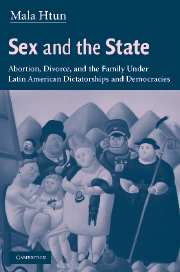 Sex and the State
Sex and the State Book contents
- Frontmatter
- Contents
- Acknowledgments
- Note on Translations
- 1 Sex and the State in Latin America
- 2 Four Normative Traditions
- 3 Reforming Women's Rights Under Military Dictatorships
- 4 Church and State in the Struggle for Divorce
- 5 Completing the Agenda: Family Equality and Democratic Politics
- 6 Why Hasn't Abortion Been Decriminalized in Latin America?
- 7 Conclusion
- References
- Index
2 - Four Normative Traditions
Published online by Cambridge University Press: 08 January 2010
- Frontmatter
- Contents
- Acknowledgments
- Note on Translations
- 1 Sex and the State in Latin America
- 2 Four Normative Traditions
- 3 Reforming Women's Rights Under Military Dictatorships
- 4 Church and State in the Struggle for Divorce
- 5 Completing the Agenda: Family Equality and Democratic Politics
- 6 Why Hasn't Abortion Been Decriminalized in Latin America?
- 7 Conclusion
- References
- Index
Summary
Struggles over state policy on divorce, abortion, and family equality revolve around competing ideas of how state institutions should regulate citizen's intimate lives and relationships. Should the law uphold the husband's authority in marriage, or recognize equality between the sexes? Ought the family be protected through prohibitions on divorce, or does this violate the separation of Church and state? Must the law protect life at the moment of conception by forbidding abortion, or grant women the freedom to choose? These conflicting positions are not of recent vintage, but rooted in decades- and even centuries-old normative traditions offering distinct models of men and women's roles, reproduction and the family, and the appropriate use of state power. The normative traditions of gender and the state found in Roman Catholicism, liberalism, feminism, and socialism contextualize the political struggles depicted in this book. The agreements and disagreements among Catholicism, liberalism, feminism, and socialism helped frame gender policy debates and opposition to proposals for change.
This chapter sketches the evolution of ideas about gender policy issues in four normative traditions of gender and the state and describes the historical development of Latin American civil and criminal codes. In many ways, these normative traditions resemble the “policy paradigms” described by Peter Hall in his analysis of competing approaches to economic management (1992, 1993). A policy paradigm consists of an overarching set of ideas about how problems are to be perceived, policy goals, and techniques to achieve these goals.
- Type
- Chapter
- Information
- Sex and the StateAbortion, Divorce, and the Family under Latin American Dictatorships and Democracies, pp. 29 - 57Publisher: Cambridge University PressPrint publication year: 2003
